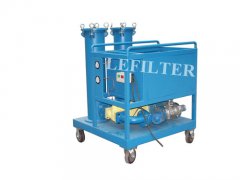The filtering effect of the vacuum oil filter is affected by a combination of factors:
1. Filter material characteristics
Filtering accuracy: The pore size of the filter material directly determines the size of impurities that can be intercepted. For example, if the filtering accuracy of the filter material is 5μm, solid particle impurities larger than this size will be intercepted. Generally speaking, the higher the filtering accuracy, the more tiny impurities can be removed, and the cleaner the oil after filtering.
Filter material: Different filter materials have different adsorption and interception capabilities for impurities. Common filter materials include filter paper, filter screen, fiber material, etc. Filter paper has good adsorption and can effectively remove tiny particles and some colloids; the filter screen intercepts particles of different sizes according to its mesh size and material characteristics; fiber material has a good adsorption effect on impurities due to its large specific surface area.

2. Vacuum system performance
Vacuum degree: Vacuum degree is a key indicator for measuring vacuum systems. A higher vacuum degree is conducive to the evaporation and discharge of water and gas. In a high vacuum environment, the water in the oil can be vaporized at a lower temperature, so that it can be separated more effectively. For example, when the vacuum degree reaches above 90kPa, the vaporization rate of water is significantly accelerated, which can better achieve oil-water separation.
Pumping rate: The pumping rate affects the efficiency of the vacuum system to exhaust gas. If the pumping rate is too slow, the gas will accumulate in the vacuum tank, which will reduce the vacuum degree and affect the removal effect of water and gas. A fast pumping rate can enable the vacuum system to discharge evaporated water and separated gas in time, and maintain a good working environment inside the vacuum oil filter.
3. Oil temperature control
Temperature setting: Appropriate oil temperature can reduce the viscosity of the oil, making it easier for impurities to be intercepted by the filter material, and it is also conducive to the evaporation of water. However, too high oil temperature may cause the oil to oxidize and deteriorate. Different oils have their appropriate filtration temperature range. For example, general lubricating oil has a better filtration effect between 40-60℃. This temperature range can not only ensure the fluidity of the oil, but also avoid chemical changes in the oil due to excessively high temperature.
Temperature uniformity: During the oil filtration process, it is also important that the temperature of the entire oil body is uniform. If the local temperature of the oil body is too high or too low, the flow characteristics of the oil in the oil filter will be inconsistent, affecting the filtering and dehydration effects. A good heating system should be able to keep the oil at a uniform temperature throughout the filtering process.

4. Oil characteristics
Impurity content and type: The initial content and type of impurities in the oil have a significant impact on the filtering effect. If the oil contains a large amount of solid particles, colloids, fibers and other impurities, it will clog the filter material faster and reduce the filtering efficiency. For example, old lubricating oil containing a large amount of metal wear particles is more difficult to filter than new lubricating oil, and the filter material needs to be replaced or cleaned more frequently.
Water content: Oils with high water content require a more powerful vacuum dehydration function to ensure that the filtered oil meets the qualified moisture standard. Different oils have different sensitivities to moisture. Insulating oil has extremely strict requirements on moisture. Even a small amount of moisture may affect its insulation performance. Therefore, when filtering insulating oil, the dehydration effect of the vacuum oil filter is required to be higher.

5. Equipment operating parameters
Flow control: If the flow rate of the oil filter is too large, the oil will stay on the filter surface for too short a time, and the impurities will not be fully intercepted, and the water and gas will not be completely separated. Reasonable flow settings should be determined based on factors such as the filtering capacity of the oil filter, the nature of the oil, and the impurity content. For example, for oils with high impurity content, the flow rate should be appropriately reduced to ensure the filtering effect.
Running time: Long-term continuous operation may cause problems such as filter material blockage and reduced vacuum system performance. Regular maintenance and appropriate operation schedules help maintain the good filtering effect of the vacuum oil filter. For example, after a certain period of continuous operation, cleaning or replacing the filter material and inspecting and maintaining the vacuum system can keep the oil filter in good working condition.
Other related products:
Coalescence dehydration oil filter machine
Vacuum oil filter machine
High viscosity oil filter machine
{sval:sql sql='SELECT n_parameter FROM dede_addonarticle WHERE aid = ~aid~ ' } {/sval:sql}
{sval:sql sql='SELECT n_parameter FROM dede_addonarticle WHERE aid = ~aid~ ' } {/sval:sql}












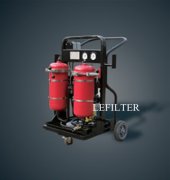
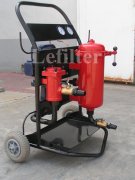
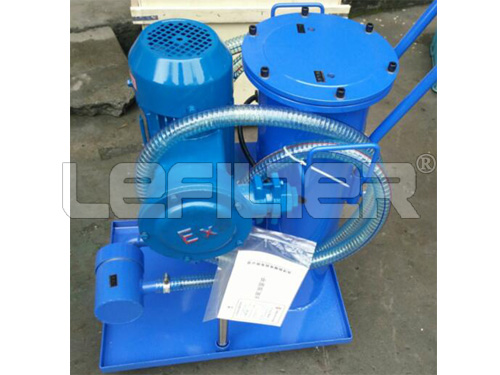
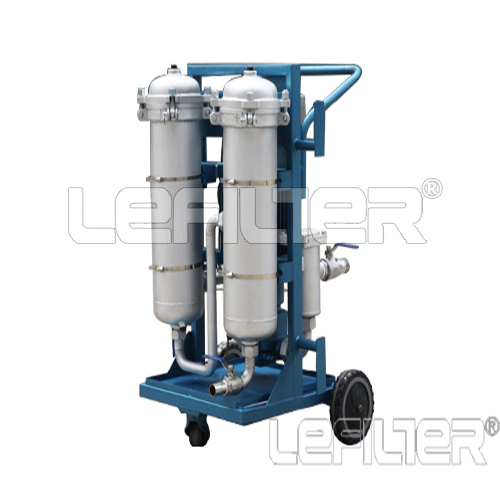
.jpg)
